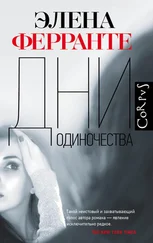I stood with the two bunches of flowers in my hand, staring at Enzo as he appeared in a black-and-white photo. He didn’t look handsome and that disappointed me. He had a round face and was smiling, with white, wolf-like teeth. His nose was large, his eyes very lively, his forehead low and framed by wavy black hair. He must have been stupid, I thought, at my house a broad forehead—my mother, my father, I had one like that—was considered a sure sign of intelligence and noble sentiments, while a low forehead, my father said, was characteristic of imbeciles. But, I said to myself, eyes are meaningful, too (this my mother claimed): the more they sparkle, the smarter the person is. Enzo’s eyes shot arrows of happiness, and so I was confused by a gaze that was in evident contradiction with the forehead.
In the silence of the cemetery, Vittoria’s loud voice could be heard battling with someone, which worried me, I was afraid they would beat her or have her arrested, and on my own I wouldn’t have known how to get out of that place, which all seemed the same, with its rustling sounds, small birds, rotting flowers. But she returned quickly with a mopey old man who opened up a metal-framed chair with striped fabric and right away started sweeping the path. She watched him with a hostile expression and asked me:
“What do you say about Enzo? He’s handsome, isn’t he handsome?”
“He’s handsome,” I lied.
“He’s very handsome,” she corrected me. And as soon as the old man left, she took the faded flowers out of the vases, threw them to one side along with the stagnant water, ordered me to go get fresh water at a fountain that I would find just around the corner. I was afraid of getting lost, so I hesitated, and she chased me away, waving her hand: go, go.
I went, I found the fountain, which had a feeble jet. With a shudder I imagined that Enzo’s ghost was whispering affectionate words to Vittoria from the cross-shaped slits. How I liked that bond that had never been broken. The water gave a hiss, slowly lengthening its stream into the metal vases. If Enzo was an ugly man, well, his ugliness suddenly moved me, or rather the word lost meaning, dissolved in the gurgle of the water. What truly counted was the capacity to inspire love, even if one was ugly, even if spiteful, even if stupid. I felt there was some grandeur in that, and hoped that, whatever face was coming to me, I would have that capacity, as Enzo surely had, and Vittoria had. I went back to the tomb with the two vases full of water, hoping that my aunt would continue to talk to me as if I were a grownup and tell me in detail, in her brazen semi-dialect, about that supreme love.
But as soon as I turned onto the path I got scared. Vittoria was sitting, legs spread, on the folding chair the old man had brought and was bent over, her face in her hands, her elbows on her thighs. She was talking—she was talking to Enzo, it wasn’t a fantasy, I heard her voice but not what she was saying. She really maintained relations with him, even after death, and that dialogue of theirs filled me with emotion. I advanced as slowly as possible, stamping on the dirt path with the soles of my feet so she’d hear me. But she didn’t seem to notice me until I was beside her. At that point she took her hands away from her face, sliding them slowly over her skin: a painful movement that was intended to wipe away the tears and at the same time deliberately show me her grief, without embarrassment but, rather, as a medal. Eyes red and shining, wet at the corners. At my house, it was a duty to hide your feelings, not to seemed impolite. Whereas she, after seventeen years—what seemed an eternity to me—was still in despair, wept in front of the tomb, spoke to the marble, addressed bones she couldn’t even see, a man who no longer existed. She took just one of the vases and said wearily: you arrange your flowers and I will do mine. I obeyed, placing my vase on the ground, unwrapping the flowers, while she, sniffling, unwrapped hers and grumbled:
“Did you tell your father I told you about Enzo? And did he talk to you about him? Did he tell you the truth? Did he tell you that first he acted like his friend—he wanted to know everything about Enzo, tell me, he would say to him—and then he made him suffer, ruined him? Did he tell you how we fought over the house, our parents’ house, that pit of a house where I live now?”
I shook my head no, and would have liked to explain to her that I wasn’t interested in their stories of fights, I just wanted her to tell me about love, I didn’t know anyone who could talk to me about it the way she could. But Vittoria wanted above all to say bad things about my father, and insisted that I listen, she wanted me to understand clearly why she was angry with him. So—sitting on the chair arranging her flowers, I doing the same, squatting nearby—she started in on the story of the fight over the house, the only thing left by the parents to their five children.
It was a long story and was hurtful to me. Your father—she said—didn’t want to give in. He was adamant: the house belongs to all of us, it’s Papa and Mamma’s house, they bought it with their money, and I’m the only one who helped them, and to help them I put my money into it. I answered: it’s true, Andrea, but all of you are settled, one way or another you have jobs, but I have nothing, and the others agree about leaving it all to me. But he said that we had to sell the house and divide the proceeds among the five of us. If the others didn’t want their share, fine, but he wanted his. There was an argument that went on for months: your father on one side and the three others and I on the other. Since no solution could be found, Enzo intervened—look at him, with that face, those eyes, that smile. At the time, no one knew about our great love story but your father, who was his friend, my brother, and our adviser. Enzo defended me, he said: Andrea, your sister can’t compensate you, where would she get the money. And your father said to him: you shut up, you’re nobody, you don’t know how to put two words together, what do you have to do with my business and my sister. Enzo was too distressed, he said: all right, let’s have the house appraised and I’ll give you your share out of my own pocket. But your father started cursing, he yelled at him: how can you give me the money, you shit, you’re just a cop, where would you find the money, and if you have it that means you’re a thief, a thief in a uniform. And so on like that, you see? Your father went so far as to tell him—listen carefully, he seems like a refined man but he’s crude—that he, Enzo, was not only screwing me but also wanted to screw the rest of us out of our parents’ house. So Enzo said if he kept on like that he’d take out his pistol and shoot him. He said “I’ll shoot you” so convincingly that your father turned white with fear, he shut up and left. But now, Giannì—here my aunt blew her nose, dried her wet eyes, began to twist her mouth to contain passion and fury—you must listen well to what your father did: he went straight to Enzo’s wife and in front of the three children said: Margherì, your husband is fucking my sister. He did that, he took that responsibility on himself, and he made a mess of my life, Enzo’s, Margherita’s, and the life of those three poor little kids.
Now the sun had reached the flower bed and the flowers shone in the vases much brighter than the lamp in the shape of a flame: the light of day made the colors so vivid that the light of the dead seemed useless, appeared spent. I felt sad, sad for Vittoria, for Enzo, for his wife, Margherita, for the three small children. Was it possible that my father had behaved like that? I couldn’t believe it, he had always said: the worst thing, Giovanna, is to be a snitch. And yet, according to Vittoria, he had done that, and even though he must have had good reasons—I was sure—it wasn’t like him, no, I ruled it out. But I didn’t dare say so to Vittoria, it seemed offensive to claim that, on the seventeenth anniversary of their love, she was telling lies in front of Enzo’s tomb. So I said nothing, though I was unhappy that once again I wasn’t defending my father, and I looked at her uncertainly, while she, as if to soothe herself, cleaned with a tear-stained handkerchief the glass ovals that protected the photos. The silence weighed on me, and I asked her:
Читать дальше
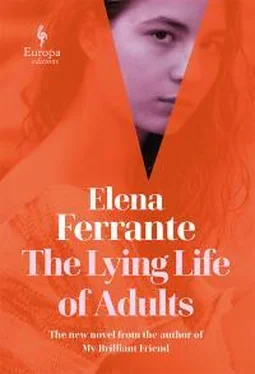
![Элена Ферранте - История о пропавшем ребенке [litres]](/books/32091/elena-ferrante-istoriya-o-propavshem-rebenke-litres-thumb.webp)
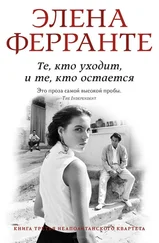
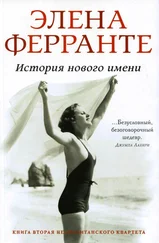
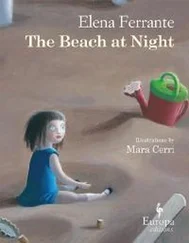
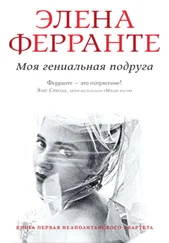
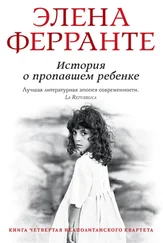
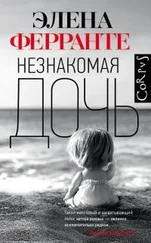
![Элена Ферранте - Дни одиночества [litres]](/books/404671/elena-ferrante-dni-odinochestva-litres-thumb.webp)


